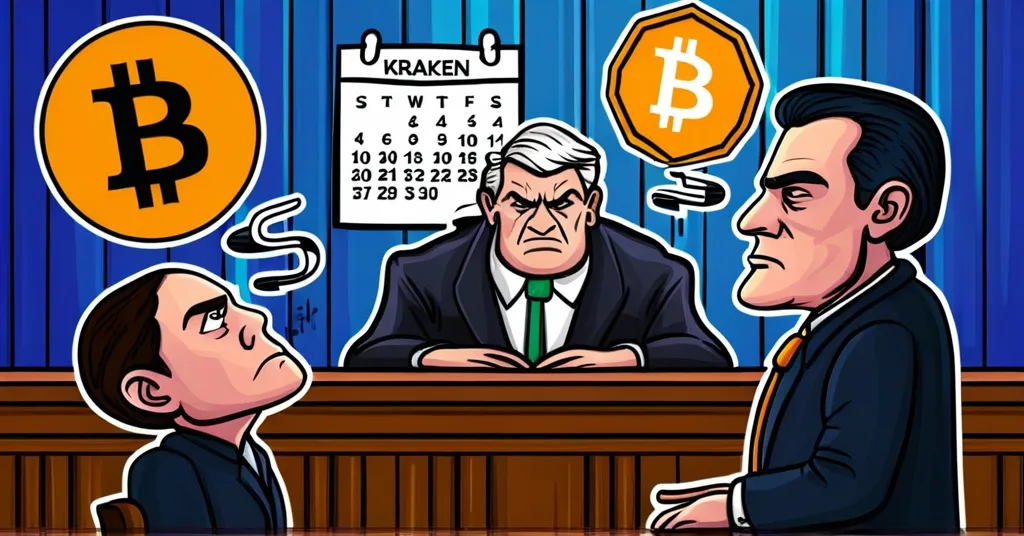Kraken vs SEC: Legal Battle Could Redefine Bitcoin and Ether Regulation

Kraken vs SEC: Unpacking the Crypto Classification Conflict
Kraken, a heavyweight in the cryptocurrency exchange landscape, is embroiled in a contentious legal dispute with the US Securities and Exchange Commission (SEC). At the heart of this clash lies a discovery disagreement that could reshape how cryptocurrencies like Bitcoin and Ether are classified and regulated.
- Kraken and the SEC are locked in a legal dispute over document access.
- The focus is on SEC documents related to Bitcoin and Ether.
- A magistrate judge denied Kraken’s request to compel document production.
- Objection deadline has been extended to March 31, 2025, to allow further discourse.
- William Hinman’s 2018 speech is a crucial element in the case.
- The Ripple vs SEC lawsuit serves as a parallel legal battle.
At the center of this legal storm is Kraken’s demand for the SEC to disclose documents that clarify the regulatory status of Bitcoin, Ether, and other digital assets under federal securities laws. The court’s refusal to compel the SEC to produce these documents marked a setback for Kraken, as the magistrate judge found their argument “unpersuasive.”
A pivotal component of Kraken’s defense is former SEC official William Hinman’s 2018 speech, which suggested that digital assets might not qualify as securities if they are sufficiently decentralized. Kraken’s position hinges on the assertion that Bitcoin and Ether fall into this category, challenging the SEC’s interpretation.
“Kraken’s argument was found ‘unpersuasive’ by the magistrate judge.”
Both parties have agreed to extend the deadline for filing objections until March 31, 2025. This extension provides crucial breathing room for ongoing negotiations and potential legal maneuvers. The outcome could have significant consequences for the broader crypto industry, setting legal precedents that affect how digital assets are classified and regulated.
The Ripple vs SEC lawsuit forms a parallel narrative, underscoring similar issues of regulatory clarity and classification. Ripple’s Chief Legal Officer, Stuart Alderoty, has been vocal in criticizing the SEC’s approach, calling for an end to the protracted legal battle. This sentiment echoes across the crypto industry, where companies seek clear guidelines to navigate the regulatory landscape.
The crypto community is keeping a close watch on these developments. Kraken’s reliance on the fair notice defense and major questions doctrine could influence future regulatory frameworks, shaping the SEC’s approach to digital asset classification.
Key Questions & Answers
Here are some of the pressing questions arising from the Kraken and SEC legal dispute:
What is the current dispute between Kraken and the SEC?
The dispute involves Kraken’s request for SEC documents related to Bitcoin, Ether, and digital asset policies, which the SEC has opposed.
What is the significance of William Hinman’s speech in this context?
Hinman’s speech is used by Kraken to argue that Bitcoin and Ether should not be classified as securities, based on their decentralized nature.
Why has the deadline for filing objections been extended?
The deadline extension to March 31, 2025, allows more time for discussions and potential legal strategies.
Who is representing Kraken in this legal battle?
Kraken is represented by lawyer Matthew C. Solomon.
What parallels are drawn with the Ripple vs SEC lawsuit?
Like Kraken’s case, Ripple’s lawsuit involves debates over the classification of cryptocurrencies under federal securities laws.
As these legal battles unfold, Kraken’s strategy reflects a broader industry demand for regulatory transparency and fairness. With the potential for significant changes on the horizon, these cases highlight the delicate balance between fostering innovation and ensuring compliance in the ever-evolving crypto world.



